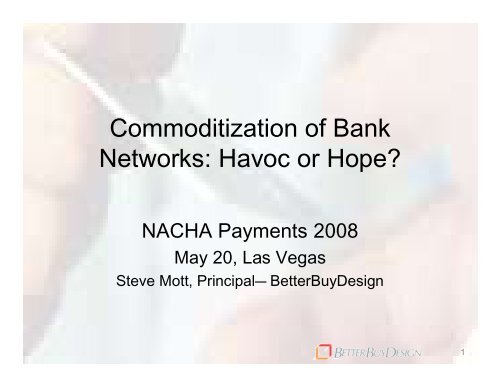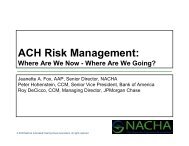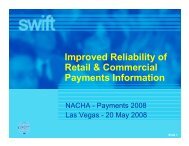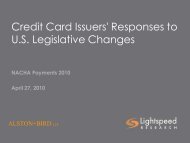Sig-Debit Card
Sig-Debit Card
Sig-Debit Card
You also want an ePaper? Increase the reach of your titles
YUMPU automatically turns print PDFs into web optimized ePapers that Google loves.
Commoditization of Bank<br />
Networks: Havoc or Hope?<br />
NACHA Payments 2008<br />
May 20, Las Vegas<br />
Steve Mott, Principal— BetterBuyDesign<br />
1
Key Takeaways<br />
1. Networks have come to mean different things for<br />
different generations of consumers<br />
2. Mounting forces are turning oncesacrosanct bank<br />
networks into open platforms for innovation<br />
3. Examples of commoditization spring directly from<br />
exploitation of common networks (especially the ACH)<br />
4. Private network options lessen banks’degrees of<br />
freedom and security<br />
5. Decoupled <strong>Debit</strong> poses a paradigm shift<br />
6. At the bottom of much of this change lies the ACH and<br />
EFT networks, which ironically are working to increase<br />
network value<br />
7. Quandary is how/where FIs will benefit in the new<br />
paradigm<br />
2
1. Physical to Social Network Transition<br />
3
Facebook: New Home for Digital Transacting<br />
4
Second Life: Banks, Currency, even Scams<br />
5
Social Networks Redefine Lending<br />
6
2. Sweeping Forces Changing<br />
Payments Network Marketplace<br />
• Massive transition to electronic payments puts<br />
everything into play<br />
• Needs and ways to access DDAs proliferate<br />
• Mounting challenges to credit cards<br />
– Industry maturing<br />
– Too many eating off the food chain<br />
– Too few make the money<br />
– Customer reach extends too far<br />
– <strong>Card</strong> economics get out of whack<br />
– Success in priming the pump lessens<br />
– Emerging markets underserved<br />
– Alternative solutions gain traction<br />
• Redefinition of debit cards risks the ‘franchise’…<br />
7
Major Shifts in Channels/Types Underway<br />
250<br />
Payment Volume by Product (Bil. Txns.)<br />
200<br />
150<br />
Stored Value<br />
PreAuth<br />
ElectBenXfer<br />
Remote/Internet<br />
PINdebit<br />
100<br />
<strong>Sig</strong>debit<br />
Credit <strong>Card</strong>s<br />
50<br />
Cash<br />
0<br />
Checks<br />
2004 2005 2006 2007 2008 2009 2010 2011 2012 2013 2014 2015 2016<br />
Sources: Nilson Report (20042010); BBD projections<br />
8
The Consumer DDA: A Payments Portfolio<br />
Methods of DDA Payments (Mil. Txns.)<br />
90,000<br />
80,000<br />
70,000<br />
60,000<br />
50,000<br />
40,000<br />
30,000<br />
20,000<br />
10,000<br />
Transfers<br />
SV/Other<br />
e<strong>Debit</strong><br />
POS<strong>Debit</strong><br />
<strong>Sig</strong><strong>Debit</strong><br />
PIN<br />
Image Exchange<br />
IRD<br />
Paper<br />
ACH<br />
0<br />
2003 2004 2005 2006 2007 2008 2009 2010<br />
Sources: NACHA, JPMChase, WellsFargo, McKinsey & Co., Nilson Report; BBD Estimates<br />
9
CapOne: The Industry is Maturing<br />
10
<strong>Card</strong> Solicitations— Bottom Fishing?<br />
.05/.06<br />
11
The Expanded Credit <strong>Card</strong> Food Chain<br />
Source: Georgetown Law Center<br />
12
Too Few Participants Make the Money<br />
Graphic provided by: Assoc. Prof. Adam Levitin, Georgetown Law Center<br />
13
ChargeOffs: Reaching Too Far…<br />
Visa/Master<strong>Card</strong> Fraud vs. Nonfraud Chargeoffs ($ mil.)<br />
$40,000<br />
$35,000<br />
$30,000<br />
$25,000<br />
$20,000<br />
$15,000<br />
Nonfraud<br />
Fraud<br />
$10,000<br />
$5,000<br />
$0<br />
1991 1993 1995 1997 1999 2001 2003 2005 2007e<br />
Sources: Nilson Report, industry publications, BBD estimates<br />
14
Economics of Bank <strong>Card</strong> Use<br />
Credit $8.16<br />
<strong>Sig</strong><strong>Debit</strong> $2.16<br />
PINdebit $.26<br />
Sources: <strong>Card</strong>s & Payments Magazine, ATM <strong>Debit</strong> News, BBD estimates<br />
15
Sources of Credit <strong>Card</strong> Revenue<br />
<strong>Card</strong> Revenue per transaction<br />
$9.00<br />
$8.00<br />
$7.00<br />
$6.00<br />
$5.00<br />
Enhancements<br />
Total: $8.16<br />
Interchange<br />
Annual fees<br />
CashAdvance<br />
Penalty fees<br />
$4.00<br />
$3.00<br />
$2.00<br />
Interest<br />
$1.00<br />
$0.00<br />
Credit <strong>Card</strong><br />
Source: <strong>Card</strong>s & Payments Magazine, 5/2007, plus BBD projections<br />
16
Source of <strong>Sig</strong><strong>Debit</strong> <strong>Card</strong> Revenue<br />
<strong>Card</strong> Revenue per transaction<br />
$2.50<br />
Total: $2.16<br />
$2.00<br />
Interchange<br />
$1.50<br />
Other fees<br />
$1.00<br />
NSFs/<br />
Penalty<br />
Fees<br />
$0.50<br />
$0.00<br />
"Interest"<br />
<strong>Sig</strong>debit <strong>Card</strong><br />
Source: BBD client data<br />
17
Source of PIN<strong>Debit</strong> <strong>Card</strong> Revenue<br />
<strong>Card</strong> Revenue per transaction<br />
$0.30<br />
$0.25<br />
Total: $.258<br />
$0.20<br />
$0.15<br />
Interchange<br />
$0.10<br />
$0.05<br />
$0.00<br />
Other fees<br />
NSFs/Penalty<br />
Fees<br />
PINdebit card<br />
Sources: Nilson Reports, industry publications, plus BBD client data<br />
18
Is the Bloom Off Rewards <strong>Card</strong>s?<br />
•80% of credit card<br />
offers today carry<br />
rewards;<br />
•71% of sigdebit<br />
issuers offer rewards<br />
•83% of consumers<br />
who have them use<br />
them as primary card<br />
Sources: <strong>Card</strong>Trak, Edgar Dunn/TransUnion, Celent; Financial Insights<br />
19
Emerging Needs Inexpertly Addressed<br />
20
Alternative Payments Gain Traction<br />
21
Consumers Shift to <strong>Debit</strong>, but at a cost…<br />
A new study has found that more consumers prefer debit cards<br />
than any other type of payment for pointofsale purchases. This is<br />
the first time in the study's history that debit cards exceeded all<br />
other payment devices as the overall preferred payment product.<br />
The "Payment Dynamics 2007 Preferred Payments Study" from<br />
TransUnion and Edgar, Dunn & Company found that 29% of<br />
respondents prefer debit cards versus 26% for credit cards. This<br />
year's study shows fewer consumers are adding payment<br />
products to their wallets and more consumers are eliminating<br />
products from their wallets than in prior years' studies. Only<br />
31% of respondents added a new payment device to their wallet<br />
this past year versus 56% in 2004, while 20% of consumers said<br />
they shed payment products compared to 16% in 2004. The study<br />
also showed that rewards credit cards represent 50% of all<br />
preferred credit cards with 83% of rewards card owners using their<br />
reward credit card<br />
<strong>Debit</strong> <strong>Card</strong> Overdraft Costs $2 for Every Dollar Borrowed; Banks Get $53B in Fees<br />
•More banks are allowing customers to overdraw with debit card purchases and at ATMs, then hitting them with fees of up to $35,<br />
according to the Center for Responsible Lending.<br />
•The average fee for overdrawing your account, by check or debit, reached a record high of $27.40 last year, up 11% from five years<br />
before, according to Bankrate.com, reports USA Today..<br />
•In 2006, financial institutions earned $53 billion in overdraft fees, a 58% increase from 2001, estimates consultant Moebs Services.<br />
•Consumers are not happy. In a survey conducted by the Center for Responsible Lending, 61% of consumers who had a preference<br />
said they would want to have their bank deny a debit card transaction — rather than approve it and charge a fee — if it will overdraw the<br />
account.<br />
•Making an instore debit card purchase is by far the most expensive way to overdraft, costing $2.17 for every dollar borrowed. By<br />
comparison, checktriggered overdraft loans cost $0.86 per dollar borrowed, according to the report.<br />
22
3. Commoditization from Within<br />
• Added value for Merchants<br />
dissolves value of network<br />
• PayPal emerges as 800lb.<br />
gorilla in eCommerce<br />
– Friendlier merchant proposition<br />
– Friendlier consumer proposition<br />
– Solves security issues easily<br />
– Business model makes GOOD money!<br />
23
PayPal: Adoption Exemplar<br />
24
Lots of Ways to Transact<br />
25
Merchant Adoption is Surging<br />
26
Instant Credit and High Interest on Deposits<br />
27
PayPal Plugin: MClevel Acceptance<br />
28
Redirection from Merchant to PayPal site<br />
29
Instant Credit as Needed (with backup)<br />
30
PayPal Plugin Offers Universal Payment<br />
31
A Separate Login is Required to PayPal<br />
32
A Onetime Number is Generated<br />
33
It Works (and Generates Receipts)!<br />
34
Business Model Arbitrages Bank Networks<br />
35
Margins Continue to Grow<br />
36
4. MerchantBased Hybrid Networks<br />
• Prepaid reload networks spawning<br />
• Collaborating merchants experimenting<br />
• WalMart joins the fray<br />
37
Reloadable Prepaid <strong>Card</strong> Market Grows<br />
Source: Digital Transactions Magazine, 3/08<br />
38
Restricted Authorization Networks Emerge<br />
39
WalMart Immersed in <strong>Card</strong> Business<br />
40
Credit <strong>Card</strong> Uses Hybrid Networks<br />
41
Prepaid ‘Money<strong>Card</strong>’Uses 3 Networks<br />
42
Revolution <strong>Card</strong> Tries to Change Paradigm<br />
43
New Value Proposition Leverages PIN<br />
Consumer Value Proposition<br />
The Revolution<strong>Card</strong> is different than other<br />
credit cards.<br />
Not only is it designed to be flexible, but<br />
we're constantly adding new features.<br />
• Credit card with flexible features<br />
• PINbased for greater control and security<br />
• Instant rewards through merchant partners<br />
• Competitive APRs<br />
Revolution<strong>Card</strong> is a PINbased credit card.<br />
If your card is lost or stolen, any<br />
unauthorized user must know your PIN to<br />
make purchases. And you can change your<br />
PIN as often as you like.<br />
Revolution<strong>Card</strong> is not embossed.<br />
You won't find your name or account<br />
number anywhere on itand neither will<br />
anyone else.<br />
• No physical data is stored on the card.<br />
• Limits identity theft<br />
• Reduces fraudulent charges<br />
• Lowers risk if card is lost or stolen<br />
Merchant Value Proposition<br />
Welcome to Revolution<strong>Card</strong> for Merchants<br />
• The new direction of credit cards. And a whole new<br />
payment platform designed for the way you do<br />
business.<br />
• Revolution<strong>Card</strong> works just like the traditional credit<br />
cards you're used to. With one big difference: No<br />
interchange fees. Which means you keep more of<br />
your profits with every sale.<br />
Revolution<strong>Card</strong>:<br />
• Eliminates interchange fees.<br />
– Save on every transaction.<br />
– Increase your profit margins.<br />
– Reduce your credit card fees by up to 80%.<br />
• Maintains a more secure environment.<br />
– A more reliable, faster, and highly secure environment<br />
for transaction processing.<br />
– <strong>Sig</strong>nificantly reduces transaction disputes.<br />
– PINbased system virtually eliminates unauthorized<br />
transactions.<br />
• Amplifies marketing campaigns.<br />
– Launch comarketing programs.<br />
– Enhance your existing rewards and loyalty programs.<br />
– Lower your customer acquisition costs and boost<br />
customer spend<br />
Source: Revolution <strong>Card</strong> website<br />
44
A Better Mousetrap for Digital Era?<br />
45
HSBC’s Tempo (formerly <strong>Debit</strong>man) Grows<br />
46
‘NetworkinaBox’(via ACH) Arrives<br />
47
5. Decoupled <strong>Debit</strong>: Eating from Within?<br />
48
Decoupled <strong>Debit</strong>— An Overview<br />
49
Decoupled <strong>Debit</strong>’s Impact on Rewards<br />
• "Incumbent deposit institutions will need to react to the risk of<br />
disintermediation as their business model, which is based on<br />
punitive fees and interchange income, comes under pressure,"<br />
says Gwenn Bézard, research director at Aite Group and author<br />
of the report. "Decoupled debit cards will also expose Visa,<br />
Master<strong>Card</strong>, and incumbent EFT networks to new competition<br />
from the likes of American Express and Discover in the debit<br />
arena," predicts Bézard. Aite Group anticipates that competition<br />
on rewards will force major financial institutions to accelerate<br />
their shift to enterprise rewards to resist consumers' cherrypicking<br />
of the debit card product.<br />
• Paul Grill, a partner of First Annapolis Consulting in Linthicum,<br />
Md., agrees. “Capital One is a great marketer, and this product<br />
is going to put pressure on banks to offer much better debit card<br />
rewards.”<br />
Sources: Aite Group, Transaction Trends<br />
50
CapOne Projected Rewards Level<br />
Positioning<br />
Source: Aite Group<br />
51
Consumer Adoption Issues?<br />
• “This is an industry shaker, but consumers are fickle and<br />
it could be difficult for them to break out of the traditional<br />
debit card model,”Pamela Hayward, Mercator<br />
• “Will consumers go through the extra steps to enroll in<br />
the program? Are merchantoriented rewards enough to<br />
drive sufficient transaction volume (or even initial uptake)<br />
to make for a successful product? I think the immediate<br />
success of the product is suspect, but I suppose it<br />
depends on how Cap One is defining that success.”<br />
Bruce Cundiff, Javelin<br />
Sources: Mercator, Transaction Trends<br />
52
Decoupled <strong>Debit</strong>: Posing Risks<br />
• While decoupled debit offers monoline issuers another avenue<br />
by which to gain customers, notes Dan Schutzer, executive director<br />
of the Financial Services Technology Consortium (FSTC) in New<br />
York, it could be a huge threat to banks' deposit business.<br />
"Decoupled debit allows a bank or nonbank to issue a debit card<br />
against a DDA the issuer of the card doesn't have," he explains.<br />
• However, the risks are even greater for banks that are not involved<br />
in the decoupled debit game, notes the FSTC's Schutzer. The DDA<br />
bank is going to lose a source of revenue, he stresses. "Now you<br />
have an ACHbased debit card and that fee income is taken away<br />
from the DDA bank," Schutzer comments. "The DDA doesn't die,<br />
but it loses its profitability."<br />
• "The fear of the unknown is palpable in the financial services<br />
industry with the uncertainty of how the decoupled debit platform will<br />
affect the competitive balance of interchange and consumer loyalty<br />
within today's traditional debit card model,”says Patty Hayward,<br />
Senior Analyst of the <strong>Debit</strong> Advisory Service for Mercator Advisory<br />
Group<br />
Sources: Bank Systems & Technology, 9/2007; Mercator<br />
53
PayPal’s Virtual <strong>Debit</strong> <strong>Card</strong>Millions Tried it<br />
54
HSBC’s OptiPay program via Tempo<br />
Network Qualifies<br />
55
6. Current Sources: ACH and the EFTs<br />
56
ACH Already Dominates Bill Payment<br />
ACH <strong>Debit</strong> Payment Types (Mil. Txns.)<br />
14,000<br />
12,000<br />
10,000<br />
8,000<br />
6,000<br />
4,000<br />
2,000<br />
PPD (autopay)<br />
ARC (lockbox)<br />
WEB (online)<br />
TEL (phone)<br />
BOC (retail)<br />
POP (retail)<br />
0<br />
2004 2005 2006 2007 2008 2009 2010<br />
Source: NACHA, BBD projections<br />
57
BillPay Shifts Favor ACH/PINless <strong>Debit</strong><br />
Bill Payment Shifts by Payment Types<br />
$.35.50<br />
Percent of total annual bill pay transactions<br />
100%<br />
90%<br />
80%<br />
70%<br />
60%<br />
50%<br />
40%<br />
30%<br />
20%<br />
10%<br />
0%<br />
0.1% 0.3% 0.6%<br />
2.7%<br />
4.8%<br />
20.6%<br />
5.0%<br />
1.7%<br />
65.1%<br />
3.3%<br />
5.6%<br />
22.7%<br />
4.8%<br />
1.6%<br />
61.7%<br />
4.1% 4.9% 5.9%<br />
6.7%<br />
7.6%<br />
8.7%<br />
24.9%<br />
4.7%<br />
1.5%<br />
57.6%<br />
1.2% 2.1% 3.3%<br />
26.7%<br />
4.6%<br />
1.4%<br />
53.5%<br />
28.7%<br />
4.4%<br />
1.3%<br />
48.9%<br />
6.9%<br />
9.9%<br />
30.9%<br />
4.3%<br />
1.1%<br />
43.6%<br />
2005 2006 2007 2008 2009 2010<br />
$.01$.02<br />
Paper Checks Money Orders Cash ACH Credit <strong>Card</strong> <strong>Debit</strong> <strong>Card</strong> PINless <strong>Debit</strong><br />
Source: TowerGroup, Celent, Aite Group, BBD projections 2006<br />
58
PINdebit Online: Issuers Can Profit!<br />
Online<br />
Bankcard<br />
Payment Type<br />
Credit <strong>Card</strong><br />
<strong>Sig</strong><strong>Debit</strong> <strong>Card</strong><br />
PINdebit <strong>Card</strong><br />
@ 1.5%<br />
PINdebit <strong>Card</strong><br />
@ 1.25%<br />
PINdebit <strong>Card</strong><br />
@ 1.0%<br />
PINdebit <strong>Card</strong><br />
@ 0.75%<br />
PINdebit <strong>Card</strong><br />
@ 0.50%<br />
Net Issuer<br />
Profit<br />
$.95<br />
$.62<br />
$.97<br />
$.82<br />
$.66<br />
$.51<br />
$.35<br />
1,400<br />
1,200<br />
1,000<br />
800<br />
600<br />
400<br />
200<br />
0<br />
Realtime <strong>Debit</strong> (mil.txns.) (@PINdebt @<br />
75bps and 125bps vs. Other RTD @125 bps.)<br />
2008 2009 2010 2011 2012 2013<br />
PINdebit @ 125 bps. Extra @ 75 bps. Other RTD @ 125 bps.<br />
% of<br />
Mkt.<br />
6%<br />
8%<br />
10%<br />
59
Remote Capture, from Anywhere!<br />
Remote Capture Image Streams (Mil.Txns.)<br />
6,000<br />
5,000<br />
4,000<br />
3,000<br />
2,000<br />
1,000<br />
Small Retailer<br />
Large Retailer<br />
ATM<br />
Branch<br />
Vault/Lockbox<br />
Large Corp.<br />
0<br />
2004 2005 2006 2007 2008 2009 2010<br />
Source: Mitek; BBD Research and Projections<br />
60
SVP: Attempts to Recapture Network Value<br />
61
7. Who Profits From Commoditization?<br />
• Handicapping the product providers and markets, and<br />
speculating on potential winners and losers<br />
• Understanding the consequences of all the recent<br />
financial restructuring on the industry<br />
• Assessing the relative impact of all these changes on FI<br />
bottomlines<br />
• Evaluating which strategic options offer their best<br />
business prospects for the future<br />
• Considering a quantitative framework for projecting<br />
payment revenues and incomes over the next ten years<br />
62
The Issuers Controlling the <strong>Card</strong> Business<br />
Graphic provided by: Assoc. Prof. Adam Levitin, Georgetown Law Center<br />
63
Impact of the Master<strong>Card</strong>/Visa IPOs<br />
• MC stakes early claim (PayPal, CapOne, etc.)<br />
• Visa deals with big merchants<br />
• Both focus on transaction growth (their<br />
sustaining business model)<br />
• Less need/pressure to prop up bigbank profits<br />
(e.g., will Interlink permit PINless debit billpay?)<br />
• Big question is which one will dominate debit<br />
cards worldwide (and who gets STAR?)<br />
• New tech (e.g., contactless) needs different<br />
business model than sigdebit<br />
64
Reconstitution of the Processor Business<br />
• FD as a private company<br />
• Paymentech splitup looming<br />
• New, sleek nicheprocessors emerge<br />
• Interchange balance likely to shift toward<br />
processors’take as rates drop and products are<br />
redefined<br />
• Risk management is upforgrabs<br />
• Magstripe era coming to a close<br />
65
How/Where do FIs Participate?<br />
• Critical mass volume less critical as networks become<br />
more commoditized<br />
• Customer relationship value/requirements become<br />
paramount (pricing premium based on value replaces<br />
punitive fees and interest)<br />
• Need to manage credit, risk and transaction movements<br />
across a dozen points of access and multiple channels<br />
• Cooperation with merchants/billers can make a<br />
difference in bottomlines<br />
• DDAs are the best source of leverage now (but won’t<br />
stay that way as the concept of debit cards and accounts<br />
become commoditized)<br />
66
FI Perspective: Prisoner’s Dilemma<br />
67
Steve Mott’s Contact Coordinates<br />
0 1 0 1 0 1 0 1 0 1 0<br />
1 0 1 0 1 0 1 0 1 0 1<br />
0 1 0 1 0 1 0 1 0 1 0<br />
1 0 1 0 1 0 1 0 1 0 1<br />
0 1 0 1 0 1 0 1 0 1 0<br />
1 0 1 0 1 0 1 0 1 0 1<br />
0 1 0 1 0 1 0 1 0 1 0<br />
1 0 1 0 1 0 1 0 1 0 1<br />
0 1 0 1 0 1 0 1 0 1 0<br />
1 0 1 0 1 0 1 0 1 0 1<br />
0 1 0 1 0 1 0 1 0 1 0<br />
Steve Mott<br />
BetterBuyDesign<br />
dba CSI Management Services, Inc.<br />
1386 Long Ridge Road<br />
Stamford, CT 06903<br />
(o) 203.968.1967<br />
(f) 203.322.1012<br />
(c) 203536.0588<br />
email: stevemottusa@yahoo.com<br />
website:www.betterbuydesign.com<br />
68

















